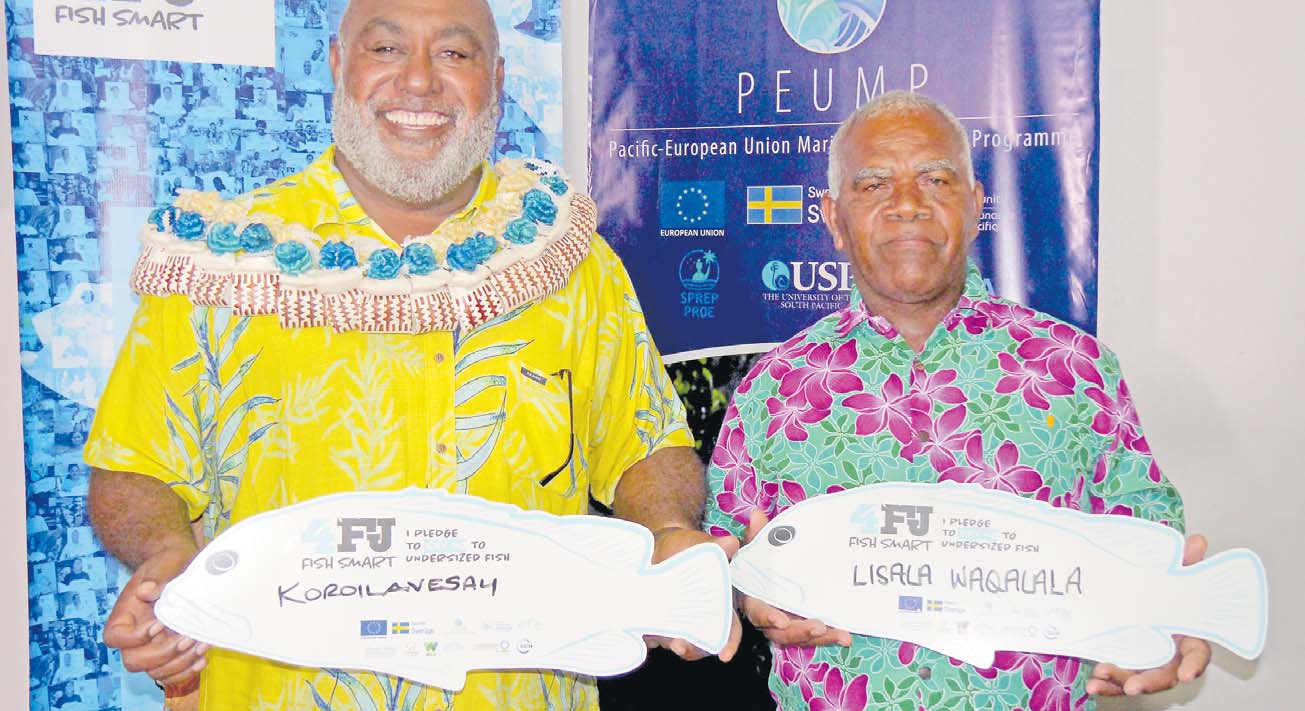LISALA Waqalala leans into the microphone at the Fijian Broadcasting Corporation studio at Gladstone Rd in Suva.
Mr Waqalala is a humble fisherman from Vitawa village in Ra but right now he has a message for the nation.
“What I ask for here is the support of my fellow fishermen. Whatever fishing technique you employ, we need to factor in the need to sustain our fish stocks,” Mr Waqalala said on a new iTaukei-language radio show called Qoli Vakamatau, or Fish Smart in English.
“We need to start talking about ways to better meet our needs today, but also tomorrow.”
Mr Waqalala is a champion for the 4FJ Fish Smart campaign which promotes fishing practices that can help revive declining fishing grounds in Fiji.
The 4FJ campaign was relaunched on November 20 at the Fiji Club led by the Minister for Fisheries, Semi Koroilavesau.
The 4FJ campaign was originally launched in 2014 to revive kawakawa and donu in Fiji by asking everyone to come together and make a pledge to avoid fishing for these two species during their peak spawning months from June through to September.
The campaign led to more than 26,000 individual pledges, scores of champions from all walks of life, a coalition of cross-sector partners, and eventually a legal ban during the peak months.
But the campaign has set out to bring the coalition back together to help the rest of the fish and critters thrive by promoting more fish smart practices, in addition to letting kawakawa and donu breed each year.
Fish Smart practices also include tabu areas, banning harmful fishing practices and gear, size limits and limiting fishing pressure through permitting and licensing.
The goal is to ensure enough fish are breeding each year to sustain fish catches.
According to one recent Wildlife Conservation Society Fiji study, it took one to two hours per day in the 1980s to catch enough fish for an entire village.
By 2000, Fiji fishers could only catch enough fish for their families.
Today, fishermen could spend 10 to 12 hours and only catch small fish. But here is some good news.
Fish Smart is just a new name for something that dates back generations in Fiji and has been supported through the Fiji Locally-Managed Marine Area network (FLMMA) for decades. Alifereti Tawake, chairman of the Locally Managed Marine Area (LMMA) International, explained: “FLMMA has been working with more than 470 communities over the past 20-25 years. What we take back to the communities is reviving the practices of our forefathers in preserving our oceans.”
The campaign is now trying to elevate the work of FLMMA and others so Fiji can have a robust national talanoa that involves all communities in Fiji to better manage Fiji’s inshore fisheries resource, and protect Fiji’s food security and livelihoods. To solve the problem of overfishing in Fiji, it will take everyone.
“The approach needs to be a communal one — a solesolevaki or solevutaki approach. It has to be a community driven approach to be effective. It has been used in other ventures and proven effective, so in the venture of replenishing our oceans with a healthy fish stocks, a communal approach is what we can employ to gain momentum,” said Mr Tawake.
That national talanoa is starting with a new radio program in partnership with Fijian Broadcasting Corporation where listeners will hear from community members such as
Mr Waqalala and hear about actions communities are taking to improve their catches.
Alumeci Nakeke, the communications officer for cChange, a nonprofit organisation in Suva that created the 4FJ campaign, explains the campaign wants to empower all communities to be able to create change.
The radio show, media stories, simple outreach tools, such as illustrated booklets, video, animations, will be used to get information to as many communities as possible.
The radio show will also allow people to talk through the challenges.
Ms Nakeke said at the community level, Fish Smart practices could help ensure we maintain and in time improve food security
and livelihoods for Fijians.
In urban areas, Ms Nakeke said people could also help by pledging to avoid undersize fish because if people continue to buy
undersize fish, it would be hard to stop overfishing regardless of community efforts.
“We will be holding pledge drives across the country, explaining the issues and asking everyone to help.” Ms Nakeke said
Mr Waqalala admits change isn’t easy.
“There are some in our communities who will always be sceptical about ideas as such. I took the message of foregoing kawakawa
and donu during the peak spawning months, into the village meeting. To be honest it wasn’t easy for us at the start,” Mr Waqalala said.
“But in time we created awareness and accountability and we made sure that if someone from outside the village came selling
kawakawa and donu we would not purchase them and when out at sea the awareness is always clear — let the fish spawn. I think we can come together again now to help all fish thrive.”
So as Mr Waqalala and others lean into the microphone, visit communities, distribute.
Fish Smart tools, support fisher forums and more in the months ahead, they are just asking for open ears.
“Like many, I want my grandchildren to experience the Fiji I have,” Mr Waqalala said.
“So let’s talk.”
The 4FJ Fish Smart campaign is funded by Pacifi c-European Union Management Programme with guidance from the Pacific Community and the Local Marine Management Area International network, and funded by Oceans 5 and the Bloomberg
Philanthropies Vibrant Ocean’s Initiative and Oceans 5.
Visit www.facebook. com/4fjmovement to learn more.
- Maciu Bolaitamata is the media manager of cChange Pacific. The views expressed are his and not necessarily of this newspaper.



